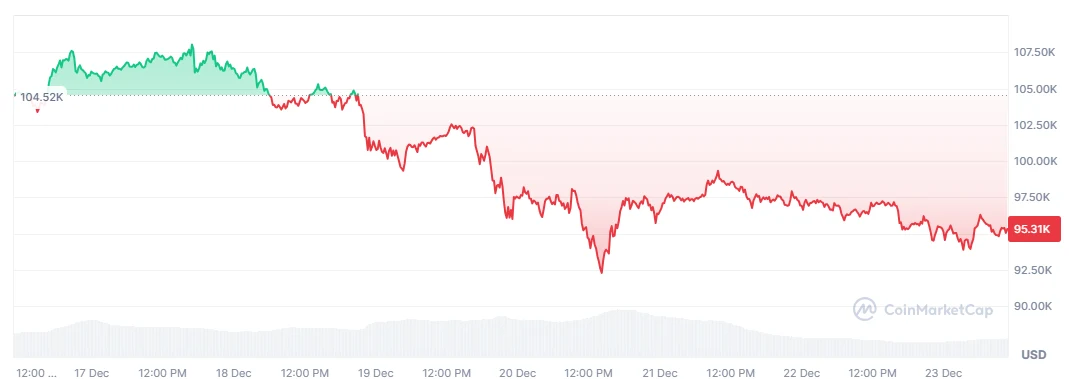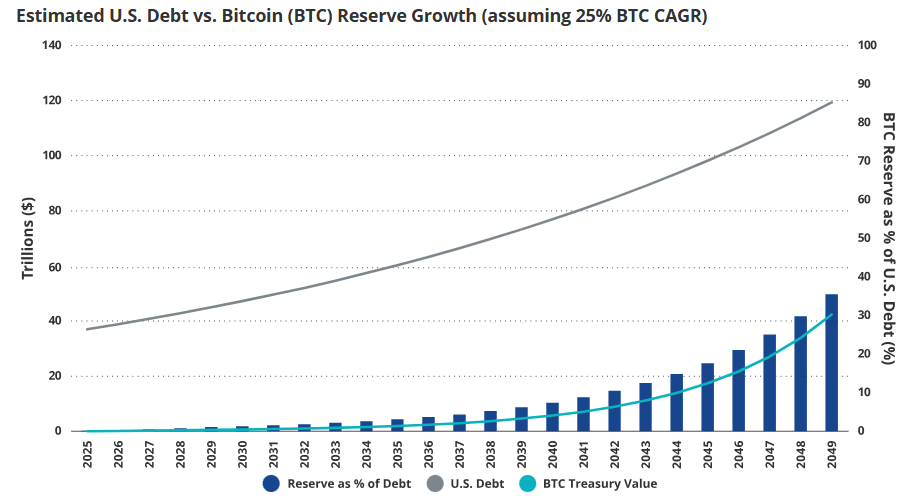Despite this setback, people are still optimistic about Bitcoin and predict it could still surge to $200,000 by 2025 due to institutional adoption and favorable regulatory shifts under the incoming administration. Japanese firm Metaplanet capitalized on the dip with a record $60 million Bitcoin purchase, while social sentiment hit a 2024 low. Long-term Bitcoin prospects are also still quite positive, bolstered by strategic proposals like a U.S. Bitcoin reserve that could cut national debt.
Bitcoin Retreats from All-Time Highs
Bitcoin experienced its first big weekly decline since Donald Trump’s November presidential election win started a rally that propelled the cryptocurrency past six figures. Over the week ending Dec. 22, Bitcoin dropped by 10%, closing at $94,645 after starting the week at close to $105,185. This decline erased approximately $10,500 from its price.
Bitcoin price action over the past week (Source: CoinMarketCap)
The downturn coincided with the Federal Reserve’s Federal Open Market Committee decision to reduce the number of projected interest rate cuts for the coming year, trimming expectations from five to just two. The federal funds rate is now expected to peak at 3.9% in 2025, compared to the previously forecasted 3.4%, creating a less favorable environment for risk-on assets like Bitcoin.
Before this decline, Bitcoin showed consistent strength by rising in six of the past seven weekly closes since Trump’s election. The only exception was a minor 0.78% retracement during the week ending Nov. 24.
Bitcoin weekly price history (Source: CoinMarketCap)
Despite this recent pullback, optimism for Bitcoin’s long-term prospects is still strong. Asset management firms like Bitwise and VanEck predict the cryptocurrency could surge to the $180,000 to $200,000 range by 2025, driven by a potential U.S. strategic Bitcoin reserve and increased institutional and corporate adoption.
Trump’s administration is also expected to create a much more favorable regulatory environment for cryptocurrencies. Some of Trump’s key appointments include hedge fund manager Scott Bessent as Secretary of Treasury and Cantor Fitzgerald CEO Howard Lutnick as Commerce Department head. Crypto advocate Paul Atkins is also set to replace Gary Gensler as chair of the Securities and Exchange Commission on Jan. 20. Atkins is a former SEC commissioner, and is anticipated to bring a more pro-crypto stance to the agency.
At press time, Bitcoin was trading hands at $95,303.85 after its price dropped by 1.35% over the past 24 hours. This is a dramatic increase from its position on Christmas Day last year when it was valued at approximately $43,600.
Japanese investment firm Metaplanet certainly took advantage of Bitcoin’s price dip by making its largest-ever Bitcoin purchase. The firm bought 619.7 BTC for nearly $60 million.
The purchase was announced on Dec. 23, and was made at an approximate price of $96,000 per Bitcoin. Metaplanet’s previous record buy was 159.7 BTC in October. This latest acquisition brought Metaplanet’s total Bitcoin holdings to 1,762 BTC, which is valued at around $168 million, with an average purchase price of $75,600 per Bitcoin.
Metaplanet’s latest purchase also makes its Bitcoin holdings the 12th-largest among public companies, trailing behind medical technology firm Semler Scientific. The company also reported some very impressive returns on its Bitcoin strategy, with a BTC Yield of 310% between October and December. This exceeded the 41.7% yield achieved in the previous quarter by far. Metaplanet uses BTC Yield as a metric to evaluate the success of its Bitcoin acquisition strategy, which it claims adds value for shareholders.
In an investor disclosure, Metaplanet revealed plans to formalize Bitcoin acquisition and management as a core business line. This initiative will include leveraging financial instruments like loans, equity, and convertible bonds to accumulate and manage Bitcoin holdings. The firm also announced its plan to raise more than $62 million through a stock acquisition program to expand its Bitcoin treasury even more.
On Dec. 18, Metaplanet projected its first operating profit since 2017. The announcement triggered a 5% surge in the company’s stock price on the Tokyo Stock Exchange, although shares are still down almost 13% over the past week. Despite its recent fluctuations, Metaplanet’s stock skyrocketed by more than 2,100% this year, driven by its embrace of Bitcoin.
Bitcoin Sentiment Hits 2024 Low
Social sentiment around Bitcoin also recently plummeted to its lowest level in 2024, which raised some speculation about a potential recovery above the $100,000 mark. Bitcoin’s correction has been accompanied by a sharp decline in retail sentiment, with a ratio of four to five positive versus negative Bitcoin-related comments on social media.
Despite the negative sentiment, some market analysts see this as an indicator of an incoming Bitcoin breakout. Market intelligence platform Santiment pointed out that fear, uncertainty, and doubt (FUD) among vocal traders could signal a market move contrary to retail expectations. Other analysts agree with this sentiment, and suggested that the end of Bitcoin’s current correction phase under $100,000 is near.
Emerging fractal patterns on Bitcoin’s daily chart point to the possibility of an imminent recovery above $100,000. Analyst Elja Boom noticed the similarities to previous patterns, and suggested a short-term reversal could be in play. However, historical data indicates that Bitcoin’s correction might continue for another week. Analyst Rekt Capital referenced prior market cycles where corrective phases extended through multiple weeks.
Looking further ahead, Bitcoin’s outlook for 2025 still appears more optimistic. Matrixport, a crypto services provider, predicts that improving macroeconomic conditions and easing global monetary policies could propel Bitcoin’s price above $160,000 by the end of next year.
U.S. Bitcoin Reserve Could Cut National Debt
Meanwhile, the United States could greatly reduce its national debt by creating a Bitcoin reserve, according to a report by asset management firm VanEck. The analysis suggests that holding 1 million Bitcoin could offset approximately 35% of the national debt by 2049, assuming Bitcoin’s price grows at a compounded annual growth rate (CAGR) of 25%. Under this scenario, Bitcoin’s value would reach $42.3 million per coin by 2049, while the national debt is projected to rise from $37 trillion in 2025 to $119.3 trillion at a 5% CAGR over the same period.
VanEck’s projection started with Bitcoin at $200,000 in 2025, more than double its current trading price of $95,360. The firm expects that Bitcoin’s value could expand to represent 18% of global financial assets by 2049, which is a big increase from its current 0.22% share of the $900 trillion market.
(Source: VanEck)
This proposal aligns with a bill that was introduced by Senator Cynthia Lummis, which advocates for the U.S. to establish a Bitcoin reserve. While Donald Trump’s incoming administration has shared its interest in using Bitcoin as a reserve asset, Lummis’ bill still has to be reviewed by Congress. Strike CEO Jack Mallers even speculated that Trump might issue an executive order on his first day in office to designate Bitcoin as a reserve asset.
Under the Lummis plan, the U.S. could take advantage of the 198,100 Bitcoin that it currently holds from asset seizures and acquire the remaining 801,900 Bitcoin through Emergency Support Functions, selling a portion of its $455 billion gold reserves, or a combination of both. This strategy would not involve money printing or taxpayer funds, according to VanEck.
VanEck also mentioned how Bitcoin’s adoption at the state, institutional, and corporate levels could accelerate its growth even more. The firm’s analysts, Matthew Sigel and Nathan Frankovitz, suggested that Bitcoin’s potential role as a settlement currency in global trade could drive its adoption, especially among BRICS nations looking to bypass U.S. sanctions. In this context, Bitcoin’s broader use as a global settlement currency could reshape its role in international finance completely and contribute to its projected growth trajectory.













